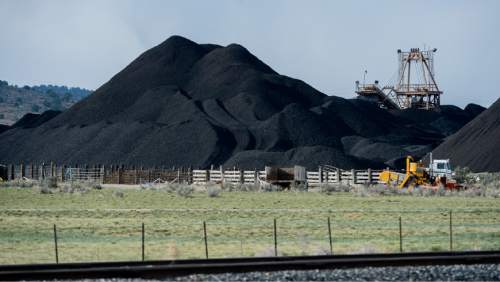This is an archived article that was published on sltrib.com in 2015, and information in the article may be outdated. It is provided only for personal research purposes and may not be reprinted.
A thick blanket of smoke has obscured the proposition to loan $53 million in state money to a private company for access to an unbuilt port in Oakland — coal smoke.
The project had shown up on the Utah Permanent Community Impact Board's agenda last April simply as "Infrastructure — Throughput Capacity." And when Utah's four largest coal-producing counties pushing the loan made their pitch at that meeting, they didn't even use the word "coal."
Instead, the backers spent most of their time talking about how the port contract would help move "Utah products," including alfalfa and salt. (If Utah put every hay cube it exports through that port, it would be around two percent of the port's capacity. Utah's loan is intended to fund one-fifth of the $275 million project.) There was also mention of potash, which none of the four counties even produce.
When one Sevier County commissioner identified the real motivation behind the project, he spoke only of his county's "energy" products. The port would be a bulk facility for dry commodities. Everyone in the room knew there is only one dry energy product, but no one used the word.
And that is what passed for a public process.
There was no mention of the fact that the city of Oakland has a policy that opposes the shipment of fossil fuels through its ports, and lawsuits could ensue. There is no guarantee the port will be completed, and it's unclear how the loan would be collateralized.
Nor was there discussion of the reason Utah coal producers are scrambling for a cheaper path to international markets: The domestic market for coal is falling with little sign of recovery. Rocky Mountain Power wants to accelerate depreciation of its Utah coal assets, and the Intermountain Power Project, another huge consumer of Utah coal, is switching to natural gas.
That might have led to inquiries about future coal supply and demand worldwide. (Demand is rising in Asia, where developing nations are still building coal-fired power plants, but so is supply from coal producers who are much closer than Utah.)
And maybe that would have led to a discussion about the greenhouse effect. The oceans are rising because humans keep pumping carbon into the air. This project would ship global warming's raw material to countries that are understandably eager for electric power but are less eager to add expensive pollution controls.
But none of that discussion happened, and that was intended because a majority of the board was in on the smokescreen. Instead, they went ahead and approved the loan — even before any formal application had been received and with full knowledge that it may not even be legal. This fund comes from mineral royalties and is intended to mitigate the impact of mineral extraction, but this project would spend money out of state to create more impact, with the hope of generating more funds. It's a pyramid-scheme approach to mitigation, and the Utah Attorney General's office has yet to sign off even though it has had months to do so.
The merits of this project are highly questionable, but it's the process that really stinks.



